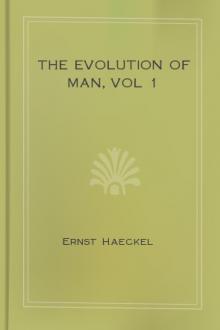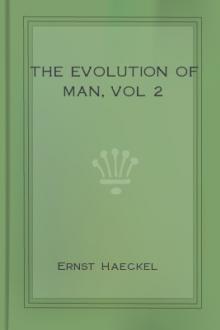Freedom in Science and Teaching. by Ernst Haeckel (my reading book txt) 📕

- Author: Ernst Haeckel
- Performer: -
Book online «Freedom in Science and Teaching. by Ernst Haeckel (my reading book txt) 📕». Author Ernst Haeckel
[10] "Wirkliche Geheime Ober-Confusionsrath."
[11] Translated under the supervision of E. Ray Lankester. London: C. Kegan Paul & Co.
CHAPTER II. CERTAIN PROOFS OF THE DOCTRINE OF DESCENT.All the common phenomena of Morphology and Physiology, of Chorology and Œkology, of Ontology and Paleontology, can be explained by the theory of descent, and referred to simple mechanical causes. It is precisely in this, viz., that the primary simple causes of all these complex aggregates of phenomena are common to them all, and that other mechanical causes for them are unthinkable—it is in this that, to us, the guarantee of their certainty consists. For this reason all these vast and manifold aggregates of facts are so many evidences of the doctrine of descent. This fundamental relation of facts has been so often expounded that I need dwell no farther on it in this place; those who wish for any closer discussion of it are referred to my "General Morphology" (vol. ii. chap. xix.), or "The History of Creation,"[12] or "The Evolution of Man" (vol. i. p. 93).[13]
And where is yet farther proof of the truth of the theory of descent to be found? Neither Virchow, nor any one of the clerical opponents and the dualistic philosophers who are perpetually reiterating this cry for more certain evidence, anywhere indicate where possibly such evidence is to be sought. Where in all the world can we discover "facts" which will speak more plainly or significantly for the truth of transmutation than the facts of comparative morphology and physiology; than the facts of the rudimentary organs and of embryonic development; than the facts revealed by fossils and the geographical distribution of organisms—in short, than the collective recognised facts of the most diverse provinces of biological science?
But I am in error—the certain proof that Virchow demands in order to be perfectly satisfied with the evidence, is to be supplied by "experiment, the test as well as the highest means of evidence." This demand, that the doctrine of descent should be grounded on experiment, is so perverse and shows such ignorance of the very essence of our theory, that though we have never been surprised at hearing it continually repeated by ignorant laymen, from the lips of a Virchow it has positively astounded us. What can in this case be proved by experiment, and what can experiment prove?
"The variability of species, the transformation of species, the transition of a species into one or more new varieties," is the answer. Now, so far as these facts can be proved by experiment, they actually have long since been experimentally proved in the completest manner. For what are the numberless trials of artificial selection for breeding purposes which men have practised for thousand of years in breeding domestic animals and cultivated plants, but physiological experiments which prove the transformation of species? As an example we may refer to the different races of horses and pigeons. The swift race-horse and the heavy pack-horse, the graceful carriage-horse and the sturdy cart-horse, the huge dray-horse and the dwarfed pony—these and many other "races" are so different from each other, that if we had found them wild we should certainly have described them as quite different varieties of one species, or even representatives of different species. Undoubtedly, these so-called "races" and "sports" of the horse tribe differ from each other in a much greater degree than do the zebra, the quagga, the mountain horse, and the other wild varieties of the horse, which every zoologist distinguishes as "bonæ species." And yet all these artificial varieties, which man has designedly produced by selection, are descended from a single common parent-form, from one wild "true variety." The same is the case with the numerous and highly differing varieties of pigeons. Domestic pigeons and carrier-pigeons, turbits and cropper-pigeons, fantail pigeons and owls, tumblers and pouters, trumpeters and laughing pigeons (or Indian doves), and the rest, are all, as Darwin has convincingly proved, descendants of a single wild variety, the rock-pigeon (Columba livia). And how wonderfully various they are, not only in general form, size, and colouring, but in the particular form of the skull, the beak, the feet, and so forth! They differ much more in every respect each from the others than the numerous wild varieties which, in systems of ornithology, are recognised as true varieties, and even as true species. It is the same with the different artificial varieties of apples, pears, pansies, dahlias, and so on; in short, of almost all the domestic varieties of animals and plants. We would lay particular stress on the fact that these artificial species which man has produced or created by artificial breeding and through experimental transformation out of one original species, differ far more one from another in physiological as well as in morphological conditions than the natural species in a wild state. With these it is self-evident that any proof by experiment of a common origin is wholly impossible. For, so soon as we subject any wild variety of animal or plant to such an experiment, we bring it under the conditions of artificial breeding.
That the morphological conception of a Species is not a positive but only a relative conception, and that it has no other absolute or positive value than those other similar system-categories—sports, varieties, races, tribes, families, classes—is now acknowledged by every systematiser who forms an honest and unprejudiced judgment of the practical systematic distinction of species. From the very nature of the case there are no limits to arbitrary discretion in this department, and there are no two systematists who are at one in every instance; this one separating forms as true varieties which that one does not. (Compare on this point "History of Creation," vol. i., p. 273.) The conception of variety or species has a different value in every small or large department of systematic Zoology and Botany.
But the conception of species has just as little any fixed physiological value. In respect to this we must especially insist that the question of hybrid offspring, the last corner of refuge of all the defenders of the constancy of species, has at present lost all significance as bearing on the conception of species. For we know now, through numerous and reliable experiences and experiments, that two different true varieties can frequently unite and produce fertile hybrids (as the hare and rabbit, lion and tiger, many different kinds of the carp and trout tribes, of willows, brambles, and others); and in the second place, the fact is equally certain that descendants of one and the same species which, according to the dogma of the old schools, could always effect a fertile union under certain circumstances, either cannot effect such a union or produce only barren hybrids (the Porto-Santo rabbit, the different races of horses, dogs, roses, hyacinths, &c.; see "History of Creation," vol. i., p. 146).
For a certain proof that the conception of species rests on a subjective abstraction and has a merely relative value—like the conception of genus, family, order, class, &c.—no class of animals is of so much importance as that of the Sponges. In it the fluctuating forms vary with such unexampled indefiniteness and variability as to make all distinction of species quite illusory. Oscar Schmidt has already pointed this out in the siliceous sponges and keratose sponges; and I, in my monograph, in three volumes, on the Calcareous Sponges (the result of five years of most accurate investigations of this small animal group), have pointed out that we may at pleasure distinguish 3, or 21, or 111, or 289, or 591 different species. I also believe that I have thus convincingly demonstrated how all these different forms of the calcareous sponges may quite naturally, and without any forcing, be traced to a single common parent-form, the simple—and not hypothetical, but existing at this present day—the simple Olynthus. Hence I think I have here produced the most positive analytical evidence of the transformation of species, and of the unity of the derivation of all the species of a given group of animals, that is generally possible.
Properly, I might spare myself these disquisitions on the question of species, for Virchow does not go into this main question of the theory of descent—but this is very characteristic of his attitude. And just as he nowhere thoroughly discusses the doctrine of transformation, neither does he enter generally on the refutation of any of the other certain proofs of the doctrine of descent which we in fact possess at the present day. Neither the morphological nor the physiological arguments for the theory of descent, neither the rudimentary organs nor the embryonic forms, neither the paleontological nor the chronological argument are anywhere closely examined and tested as to their worth or their worthlessness as "certain proofs." On the contrary, Virchow takes them quite easily, sets them aside, and declares that "certain proofs" of the doctrine of descent do not exist, but remain to be discovered. To be sure, he does not indicate where they are to be sought, nor can he indicate it. How is this strange conduct to be explained? How is it possible that a distinguished naturalist should resist the most important step forward of modern natural science without in any way specially investigating it, without even practically testing and refuting the most weighty arguments in its favour? To this question there is but one answer. Virchow is not generally intimate with the modern doctrine of evolution, and does not possess that knowledge of natural science which is indispensable for any well-grounded judgment on it.
After collecting and carefully reading all that Virchow, during many years, had written against evolution, I arrived at the conviction that he had not thoroughly read either Darwin's great work on the Origin of Species, nor any other work on the theory of descent, nor had he thought the matter out with such attention as so serious and intricate a subject absolutely demands. Virchow did with these works as it has been his well-known custom to do with many others—he hastily turned over the pages, caught at a few leading words, and without any farther trouble he has discoursed upon them, and, which is worst of all, has perpetuated these discourses through the press.
To excuse this conduct, and to account for Virchow's enigmatical position in the battle of evolution, we must consider what changes this highly-gifted and meritorious man has gone through in the course of the last thirty years. The most important and fruitful part of his life and labours was indisputably during the eight years when he resided in Würzburg, from 1848 to 1856. There Virchow, with all the keenness of his youthful intellect, with a sacred enthusiasm for scientific truth, with indefatigable powers of work and the rarest insight, worked out that glorious reform of scientific medicine which will shine through all time as a star of the first magnitude in the history of medical science. In Würzburg, Virchow elaborated that comprehensive application of the cellular theory to pathology which culminates in the conception that the cell is an independent living elementary organism, and that our human organism, like that of all the higher





Comments (0)